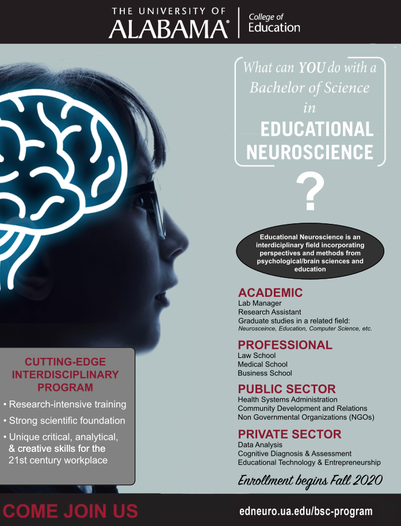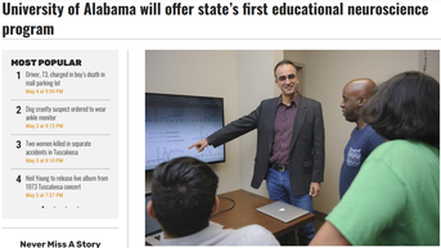New Undergraduate Program in Educational Neuroscience
We are excited to announce that the University of Alabama College of Education will soon start offering a B.Sc. Major in Educational Neuroscience. The undergraduate program in educational neuroscience was approved by the Alabama Commission on Higher Education on September 15th and by The University of Alabama Board of Trustees on September 21st. The program will be the first of its kind in the world and will start enrolling students in the Fall 2020 semester.
|
Defining
Educational Neuroscience |
Educational neuroscience is an emerging transdisciplinary field incorporating methods and perspectives from psychological and brain sciences, and education. Its principle goals are (1) to explore biological mechanisms that underlie learning and cognition, (2) to inquire how these mechanisms interact with individual and socio-cultural factors relevant to education, and (3) to develop evidence-based practices in teaching and designing learning environments.
Given its transdisciplinary nature educational neuroscience requires a foot in two worlds: psychological and brain sciences, and education. In 2014, the University of Alabama started a PhD Concentration in Education Neuroscience, under the Educational Psychology Program–one of the few PhD-level educational neuroscience programs in the world. Our goal with this program is to train educational professionals and researchers who are skilled and knowledgeable in methodologies and theoretical perspectives in both of the originating disciplines. |
|
The undergraduate program provides a strong scientific foundation in the first two years and culminates with instruction in a variety of specialized topics (see the curriculum here ). Additionally, the program presents the students with many opportunities to participate in research projects, starting with their first semester. In their junior and senior years students take a lab practicum course every semester, where they will work on an independent research project under faculty supervision. This will build on students' experiences working on different projects in their first two years and will help them develop independent research skills.
|
Coursework
|
|
Armed with an extensive theoretical foundation and strong research skills, graduates of this program will have the chance to pursue different trajectories post-graduation. We expect some of our students to continue graduate studies either in educational neuroscience or in other related fields, while others will pursue careers in health professions, public administration, private sector, non-profits, and policy. There is also a need for teachers, administrators and policy-makers with a transdisciplinary training in educational neuroscience. Therefore, after graduation, students will also have the option to acquire a teaching certificate through one of the alternative routes to certification in a relevant field of teaching. The new courses that will be offered under the educational neuroscience program will also be available to students in other programs in the College of Education and across campus. We are particularly interested in enhancing neuroscience literacy and overall scientific preparedness in our students. |

|
Overall, we are very excited to have the opportunity to build a one of a kind program at UA, with the potential to train researchers and professionals with a strong scientific foundation and a unique toolset to approach educational problems. Please contact the undergraduate program coordinator, Dr. Firat Soylu (fsoylu@ua.edu), or edneuro@ua.edu with inquiries and questions about the program. You can also visit the Educational Psychology Program website for more information.
Curriculum Plan
College: College of Education
Department: Department of Educational Studies in Psychology, Research Methodology, and Counseling
Program: B.S. in Educational Neuroscience
| Course Number/Name | Credits |
|---|---|
| PY101 Intro To Psychology | 3 |
| EN 101 English Composition | 3 |
| BSC 108 or 114/115 Intro Biology I (BSC 114/115 for premed) | 4 |
| BSC 108 or 114/115 Intro Biology I (BSC 114/115 for premed) | 4 |
| MATH125 Calculus I (or MATH 112, 113 or 115 if needed) | 3-4 |
| UA Core – Fine Art | 3 |
| ANT 100 Intro To Anthropology | 3 |
| EN 102 English Composition | 3 |
| BSC 109 or 116/117 Intro Biology II (BSC 116/117 for premed) | 4 |
| UA Core - History (HY 115 or 116 History of Science is recommend) | 3 |
| PH 101 General Physics I | 4 |
| SPE 300 Special Education and Accommodation Strategies | 3 |
| CH 101 General Chemistry I | 4 |
| BSC 215 Human Anatomy and Physiology I | 4 |
| BSC 220 Biological Evolution (Fall Only) | 3 |
| UA Core - Literature | 3 |
| BEP 305 Educational Psychology | 3 |
| CH 102 General Chemistry II or PH 102 General Physics II | 4 |
| PHL 260 Mind and Nature | 3 |
| BEP 220 Brain, Learning, and Cognition | 3 |
| UA Core – Fine Arts, Humanities, or Social and Behavioral Sci | 3 |
| BEP 310 Lab-based Research Practicum | 1-2 |
| PY 352 Developmental Psych | 3 |
| BEP 330 Computational Methods in Educational Neuroscience | 3 |
| BER 345 Educational Statistics | 3 |
| UA Core - Computer | 3 |
| UA Core – Literature or History | 3 |
| BEP 310 Lab-based Research Practicum | 1-2 |
| PY 313 Sensation and Perception (Spring Only) | 3 |
| BER 346 Experimental Methods in Educational Neuroscience | 3 |
| UA Core - Writing | 3 |
| UA Core – Computer | 3 |
| BEP 310 Lab-based Research Practicum | 1-2 |
| PY 470 Introduction to Cognitive Psychology | 3 |
| 410 Topics in Ed. Neuro.: Math Learning | 3 |
| 460 Topics in Ed. Neuro.: Reading, Language, and the Brain | 4 |
| BEP 490 Electrophysiology | 3 |
| BEP 310 Lab-based Research Practicum | 1-2 |
| BEP 420 Topics in Ed Neuro: Science Learning | 3 |
| BEP 450 Topics in Ed Neuro: Moral Psych and Ethical Dev | 3 |
| BEP 480 Neuroimaging | 4 |
| UA Core - Writing | 3 |
| Total Credits | 122 |
|---|
Media Appearances
"State's first educational neuroscience major"WBRC - Fox 6 News
Dec 4, 2018 Segment from Fox 6 News featuring the new Educational Neuroscience Undergraduate Program, with a brief interview.
|





